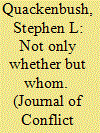| Srl | Item |
| 1 |
ID:
160532


|
|
|
|
|
| Summary/Abstract |
Uncertainty about resolve is a well-established rationalist explanation for war. In addition to estimating the resolve of immediate rivals, leaders choose their actions in a crisis based on expectations about how third parties will respond. We argue that leaders will become more likely to develop inconsistent estimates of rivals’ relative capabilities and resolve – and thus will become more likely to fight – when domestic political changes occur in states that are allied with an opponent. We also consider how the relationship between conflict in rivalries and third-party domestic change depends on domestic political institutions in the third party. We argue that this effect should only hold when a challenger does not also share an alliance with the third party, and that the effect should be strongest when the third party is a non-democratic state. We test our theory using a dataset of changes in leaders’ domestic supporting coalitions and data on militarized interstate disputes from 1920 to 2001. Consistent with our hypotheses, we find that the likelihood of conflict increases in rivalries only when domestic coalition changes occur in states that share an alliance with only one member of a rivalry, and that this effect is strongest and most consistent for non-democratic third parties.
|
|
|
|
|
|
|
|
|
|
|
|
|
|
|
|
| 2 |
ID:
072555


|
|
|
|
|
| Publication |
2006.
|
| Summary/Abstract |
Although in reality, states simultaneously pursue direct and extended deterrence, extant theories of deterrence have considered direct and extended deterrence situations separately. Furthermore, extended deterrence theories have not modeled all three actors in extended deterrence situations. To overcome these limitations in the literature, the author develops the three-party extended deterrence game and analyzes it with both complete and incomplete information, allowing conclusions to be drawn regarding deterrence and the related areas of alliance reliability and war expansion. For example, the findings indicate that deterrence is most likely to succeed when the alliance between Defender and Protégé is reliable. However, neither Defender nor Protégé wishes to be a more reliable ally than the other; if there is an asymmetry in reliability, Challenger will chose the more reliable state to attack in order to avoid a multilateral war. This counterintuitive conclusion was only reached by considering all three actors in extended deterrence.
|
|
|
|
|
|
|
|
|
|
|
|
|
|
|
|